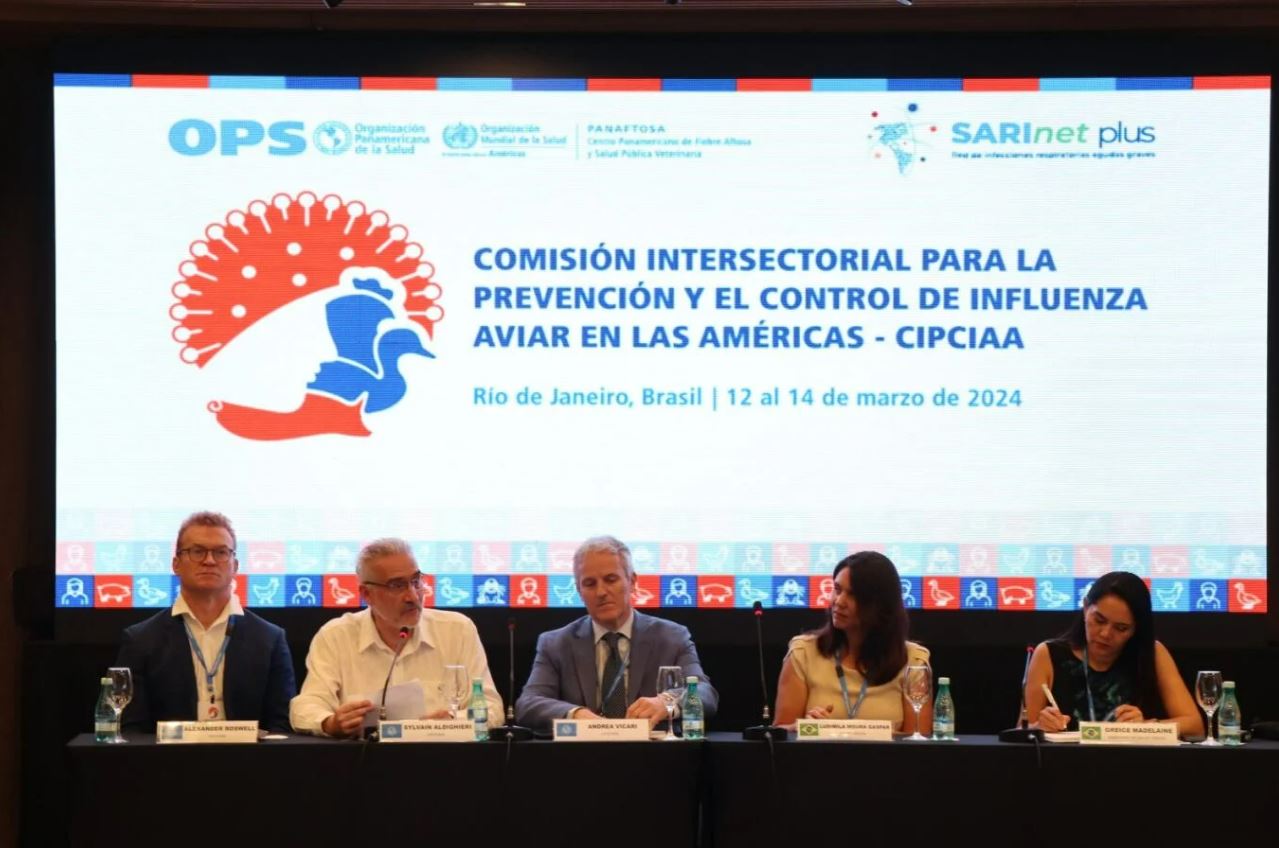
PAHO and countries of the Americas seek to establish an intersectoral commission to prevent and control avian influenza
Río de Janeiro, Brazil, 14 March 2024 – In order to strengthen surveillance, prevention and control of avian influenza in both animals and humans, the Pan American Health Organization (PAHO) convened its 35 member states in Brazil this week to establish a regional commission to combat the disease. The meeting took place at a time when the world is experiencing high levels of transmission of the virus among birds and mammals, which poses a potential risk to public health.
Participants agreed on the need to create an intersectoral commission to strengthen detection, prevention and response to zoonotic influenza. “It is essential to promote this commission under the “One Health” approach to comprehensively address zoonoses,” said Dr. Sylvain Aldighieri, Director of PAHO’s Department of Prevention, Control and Elimination of Communicable Diseases.
The Inter-sectoral Commission for the Prevention and Control of Avian Influenza in the Americas will enable public, animal and environmental health sectors to exchange updated information on surveillance, epidemiological risk and evolution of circulating viruses. The commission is also expected to promote strategies at the national, sub-regional and regional levels and strengthen coordination.
PAHO’s Health Emergency Department and the Pan American Center for Foot and Mouth Disease and Veterinary Public Health (PANAFTOSA) led the March 12-14 meeting to discuss the Commission’s objectives, structure and operation.
“One Health” is an approach that fosters intersectoral collaboration to prevent zoonotic and vector-borne diseases by mobilizing diverse stakeholders such as veterinarians, physicians, epidemiologists and community leaders.
It is estimated that 75% of emerging human infectious diseases originate in animals. Since 2020, a variant of avian influenza virus subtype A(H5N1) has caused deaths in wild birds and poultry in multiple countries in Africa, Asia, Europe, North America and, in 2022, spread to Central and South America.
In January 2023, the first case of human infection with avian influenza A(H5N1) was reported in Latin America, and since then, several countries in the region have confirmed cases in both birds and humans. So far, human cases of avian influenza have been sporadic, and no sustained human-to-human transmission has been identified.
“It is crucial that countries continue to strengthen early detection and containment of any event or outbreak at the human-animal interface,” Dr. Ciro Ugarte, Director of PAHO’s Department of Health Emergencies, said. “The various sectors involved must collaborate on both surveillance and response.”
The new Commission will comprise specialists in the areas of seasonal influenza, zoonosis, pandemics, epidemiology and laboratory from ministries of health in the Americas. It will also include veterinary officials, representatives of the environmental sector, and collaborating centers, with PAHO acting as secretariat.
According to Ottorino Cosivi, Director of PANAFTOSA, the Commission “will act as a catalyst for regional work to address avian influenza.” Cosivi highlighted the effectiveness of other regional mechanisms coordinated by PAHO, such as REDIPRA, which facilitates intersectoral collaboration in the fight against rabies in the Americas and has contributed significantly towards the elimination of this disease in the region.
Also participating in the meeting this week were representatives of several organizations, including the Food and Agriculture Organization of the United Nations (FAO), the Inter-American Institute for Cooperation on Agriculture (IICA), the International Regional Organization for Plant and Animal Health (OIRSA), the Caribbean Animal Health Network (CaribVET), the Executive Secretariat of the Council of Ministers of Health of Central America and the Dominican Republic (SE-COMISCA), the U.S. Centers for Disease Control and Prevention (CDC), the U.S. Animal and Plant Health Inspection Service (APHIS) and WHO collaborating centers for human and animal influenza.
Credits and thanks to the Pan American Health Organization (PAHO)
